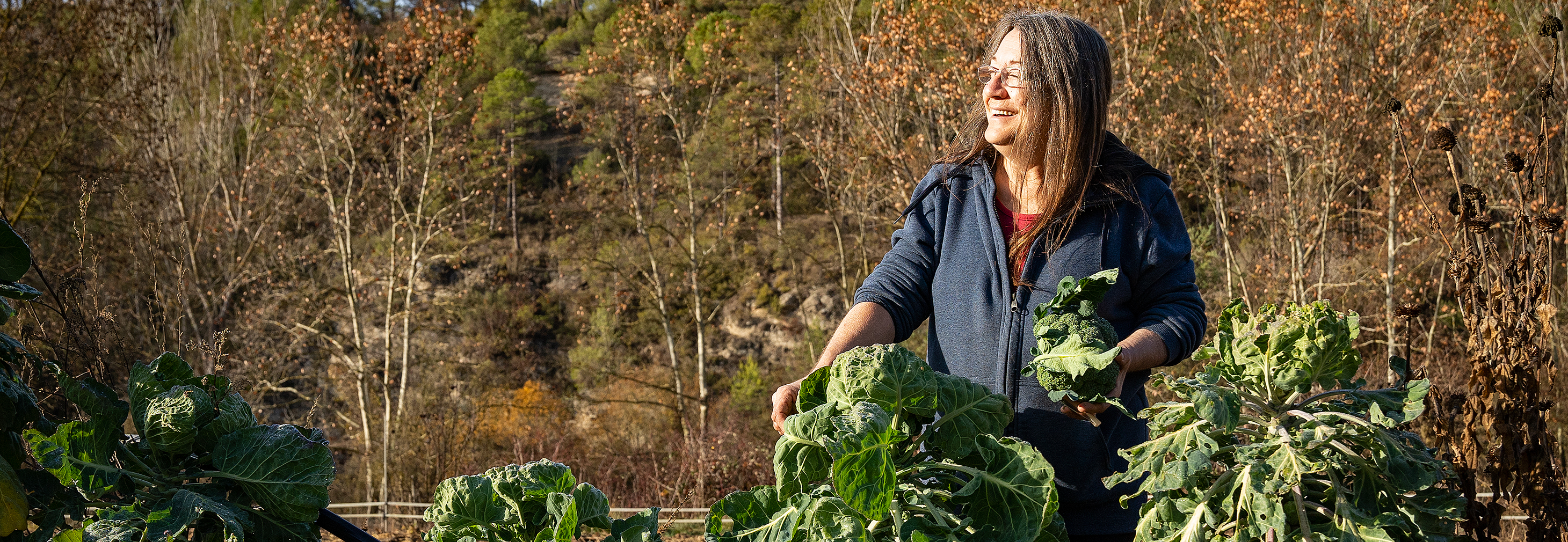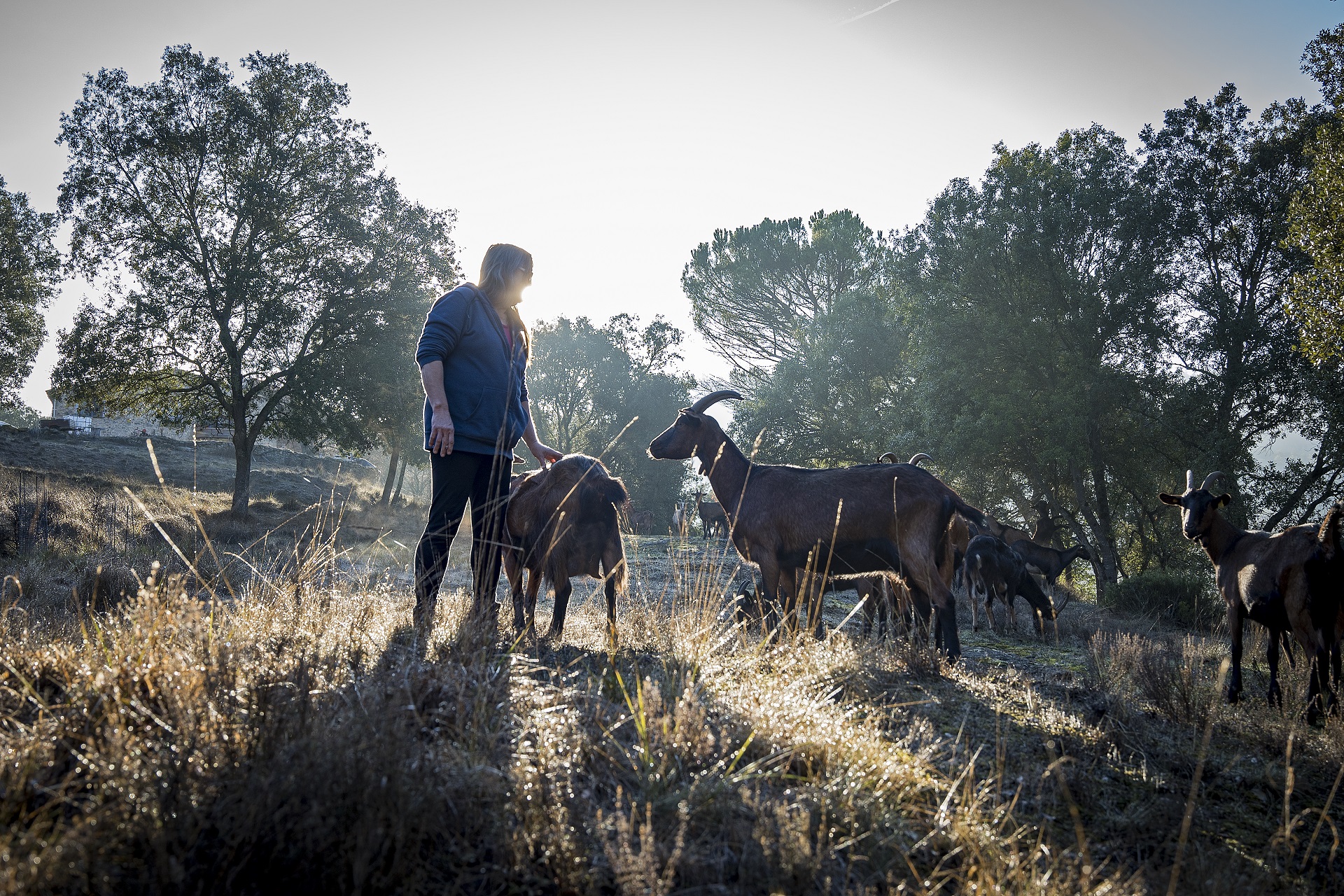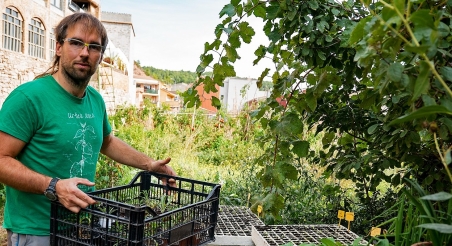The tinkling of goat bells breaks the silence that reigns in the Marfà Valley, in the county of Moianès. It’s a remote, beautiful place where a group of farmers and agricultural dreamers settled almost twenty years ago. Mas La Datzira welcomed them with land and water, but also with an important drawback: the house, set next to an old mill, had become derelict. At the beginning, all their time was devoted to rebuilding in order to put a roof over their heads. After that, they were able to start working the land and make it suitable for growing food. Once the milestone of self-sufficiency had been reached, they obtained the corresponding certification from the Catalan Council for Organic Agricultural Production (CCPAE). Today, they have a vegetable garden and greenhouses, holm oaks inoculated with truffle mycelium and a small herd of 34 goats (33 does and one buck) which, whenever they can, freely graze in the surrounding forests and in a permanent pasture field. All in all, they boast 42 hectares of paradise.
Paloma Fuentes (Sabadell, 1965) is one of the driving forces behind La Datzira Kf, Association for Sustainable Human Development. It’s an umbrella organisation for the consumer group of Casal de Ca l'Isidret and the La Unió Cooperative of the Ateneu Popular La Flor de Maig (a public socio-cultural centre), which are two organic food projects based in Barcelona’s Poblenou district. Their members periodically carry out farm work and produce preserves, cheeses, bread and other high-quality products from the bounty of their land and livestock. Nevertheless, two threats have been worrying them for some time: the structural drought that’s ravaging Catalonia and the return of wolves, which have wreaked havoc on their herd.
Paloma, how did your farming adventure begin?
I’m not from farming stock. I’m from Barcelona and I studied anthropology, which is a totally unrelated subject. In 1992, with the hosting of the Olympic Games, I needed to get out of the city. I was keen to move to the countryside and live off the land. I initially moved with a group of people to the county of Ripollès. Later on, we settled in the county of Berguedà, where we decided to become professional farmers. Living at 1,400 metres above sea level, we grew lots of potatoes and summer vegetables. In 1999 we registered with the Catalan Council for Organic Agricultural Production (CCPAE).
Have you got any memories of when you were little that could explain your desire to live in the countryside?
Nature has always been important to me. In fact, when I left Barcelona, it was out of a need I felt to live in a natural environment. I couldn’t bear any more cement! The idea that guided me most clearly was that in the countryside I could grow my own food, keep animals and pursue my commitment to degrowth. I asked myself what was the most basic thing I needed to live and acted upon the answer: a place with a roof over my head and access to food.
You say that after leaving Ripollès, you moved to Berguedà. What led you to move again after that?
We had to move from Berguedà because we didn’t have enough land on our farm, which meant we had to lease additional land that was located quite far away. When you don’t come from farming stock, finding land is extremely complicated! We didn’t have a water supply either. What’s more, our goal was to grow the widest possible variety of food organically, and we didn’t want to incorporate any company in the initiative. In fact, in Berguedà we’d joined forces with two other producers in order to supply vegetable baskets. Together with them, we founded Berga’s first consumer cooperative, La Pallofa (The Husk).
«When you don’t come from farming stock, finding land is extremely complicated» Paloma Fuentes
So how did you come across this farm, Mas La Datzira, in the county of Moianès?
A group of people we know had heard about this farm and we came with them to see it. What we liked about it was that, although the farmhouse and the mill were derelict, there was enough land and a water supply. So we decided to take it on. We devoted the first few years to rebuilding the house and restoring the fields. Then, three years later, in 2007, we created the umbrella organisation of the project: La Datzira Kf, Association for Sustainable Human Development. In fact, the lease is in the name of the organisation.
How do you operate?
We’re a not-for-profit association in which two Barcelona-based cooperatives are integrated: the consumer group of the Ca l’Isidret Social Club and the La Unió Cooperative of the Ateneu Popular La Flor de Maig (a public socio-cultural centre). The farm supplies these two consumer groups. We’ve always prioritised variety, so what we produce in our vegetable garden and from our small herd of goats is for the consumption of the two cooperatives. In winter, when we hardly grow anything, the members consume products made from summer harvest vegetables and other ingredients. Since we initiated our activity, we’ve also been collaborating with the Les Refardes cooperative and we contribute to preserving ancient varieties of traditional crops. For instance, we grow “shelling” corn, a special variety of corn that we grew back in Berguedà and that’s traditionally served in the Catalan Christmas stew.
What’s more, about nine years ago we planted holm oaks inoculated with truffle mycelium, which require quite a lot of water. This process involves mycorrhiza, a symbiotic association, in this case between the holm oak and the truffle. You tend to the tree for ten years and pray that truffles start to grow. If you get 10% of the potential yield, you can be more than happy!
At Mas la Datzira, it seems like you’re in very close contact with the people who eat your products. Are you?
We are. When we first arrived at the farm, there was a lot of work to be done, but thanks to the help of our organisation’s members we were able to restore all the fields. We’ve been working with the members of the La Unió Cooperative for 16 years, and it was thanks to them that we were able to assemble the greenhouse. As you can see, we carry out all sorts of activities, and we’d like the public authorities to acknowledge the sort of farming that encompasses a bit of everything… But they don’t.
«We’d like the public authorities to acknowledge the sort of farming that encompasses a bit of everything» Paloma Fuentes
The goats are another big attraction of the farm.
Yes, we’ve got 33 does and one young buck. Kidding takes place at the start of the year. Some of them have names: there’s Núria, the white one; Yeti, the one with the shaggy coat; Glass Eye, so named because he’s got an eye missing; and Dopti, who has no problem adopting the kids of other goats... They always graze in the surrounding forests, but we’ve also turned one of our fields into a permanent grazing zone, where we plant what they eat on certain days. The vegetable garden used to be bigger, but we’ve gradually scaled it down.
A farm as isolated as this one must present challenges. Apart from being difficult to get to, which other ones would you highlight?
Wolves. They’ve been reintroduced in this area. They preyed on four of our goats in 2021, and last year they killed three goats and two kids. So nine of our animals have suffered the consequences of their return. Since we found out that wolves were the cause, we don’t leave the goats in the forest permanently; we bring them in every night.
Apart from wolves, because we live in an isolated area, we also suffer the consequences of raids by wild boars and eagles, which is why we’ve put an electric fence around the vegetable garden.
You say that one of the strengths of La Datzira is the availability of water. Where do you get it from?
The water is supplied through hosepipes from Font del Gust, a spring located about 700 metres from the farmhouse. It’s currently at a third of its capacity, which is rather low. It’s a big worry, so much so that we’ve just bought a plastic tank with a capacity of 50,000 litres in order to store water. I’m concerned about the holm oaks, which have to be watered, and about the vegetable garden, of course.
After we first got here, between 2004 and 2007, there were some really bad droughts, which is when they built desalination plants in Barcelona, but fortune favoured us at that time and the level of our spring didn’t go down. However, over the last two years, we really have noticed changes: it’s raining increasingly less and water levels are being depleted.
What’s the main thing you’ve learned that you’ve incorporated in your life as a farmer?
I think that the capitalist system will soon bring food sovereignty to an end. Agricultural and livestock farmers will no longer be able to supply their area with local food. The capitalist system is absurd, destructive and hugely shameful. Anyone who stops to think about it can see it... But despite being aware of this, you have to keep going!
Do you believe that Mas La Datzira and your association are a space of resistance?
Yes, we’re all about resistance. We’re not here for financial reasons but rather for political ones. And we’re lucky to have the support of the members of the two consumer cooperatives that sustain us! For instance, we wanted to install some solar panels because the old ones had been destroyed by heavy winds, and we obtained them thanks to the people that help us. We also managed to erect the greenhouse through the members of the groups. When a van broke down, we decided to organise a party to raise money for the repairs and it proved a success. The 20 members of La Unió and the 12 members of the Ca l’Isidret consumer group make the project possible.
How was the relationship forged between your project in Moianès and the consumer cooperatives in Barcelona? Who brought them together?
We started talking to friends and spreading the word. In fact, we initially sold our baskets in the street: we’d arrange to meet the customer somewhere and that was that... Bear in mind that our consumers are also involved in the project because it’s in line with their principles; they support it as a political initiative. They want there to be farmers with our values, they’re committed to organic farming, and they believe in closing the gap between the city and the countryside. We’re not a business.
«Consumers are also involved in the project because it’s in line with their principles; they support it as a political initiative» Paloma Fuentes
What would you say to people who are keen to start a project in the primary sector?
As I see it, farming is a life philosophy. I believe in the ancient farming principle of looking after the environment rather than exploiting it. However, it’s not a profitable option: you do it out of principle, because you believe that’s what neds to be done. What’s more, the public authorities put obstacle after obstacle in your path! That said, I feel that the most important thing on a farm is to have as much variety as possible, to keep animals and to have a circular system. But even when it comes to organic vegetable farming you see a lot of stupidity: people who practice monoculture, who use a huge amount of plastic, who use fertilizers or who waste food if their vegetables don’t look commercially attractive enough. I’m dismayed by the amount of food that’s thrown away! Another problem, which is a systemic one, is the competition posed by supermarkets and hypermarkets. Last but by no means least, droughts are posing a major challenge.
«Farming is a life philosophy. I believe in the ancient farming principle of looking after the environment rather than exploiting it» Paloma Fuentes
Could you share a faming experience that has had a big impact on you?
Twenty years ago, I travelled to Mali to campaign against the use of transgenic crops, together with other farming associations from across Europe. We went there because Syngenta, one of the world’s largest biotechnological companies, had earmarked one million hectares for the production of transgenic crops, to be irrigated by the Niger River. I found it an incredibly useful experience! Seeing how other people live and the problems that exist in other parts of the world changes your outlook. It makes you see both sides of the coin.
What obstacles do people come across today in terms of access to farming land?
The main obstacle is land ownership. I believe that the priority should be the use of the land, not its ownership. Then there’s the issue of liquid manure, which is scandalous. Some people look for land for the purpose of dumping liquid manure there, driving up the price of leases. There’s so much farming land that isn’t being cultivated for this reason. It’s happening a lot in Moianès: a huge amount of slurry from Osona ends up here.
How do you combat the climate emergency on a daily basis at Mas La Datzira?
In all sorts of ways. To start with, we grow ancient varieties because they have greater genetic variability and adapt better to changes. Moreover, we stopped ploughing the earth 15 years ago because we’re committed to a regenerative approach. We’ve also installed a drip irrigation system in the vegetable garden, and a micro-sprinkler system for the trees. And we close cycles! All the elements that contribute to food production come from the farm itself, and we maintain the soil though our goat manure and green manure. The goats usually graze in the forest, which helps to prevent fires. Our electricity is supplied by solar panels, and the logs for our heating and hot water are sourced from these very forests.
What role does the feminist perspective play in the primary sector?
I believe that feminism has to be against the patriarchy and it’s important to defend the role of women, to achieve equality in every aspect of life, etc. I’ve fought for all of that myself! But I always call for a feminist and anti-capitalist perspective: we’re not interested in copying the businesswoman. If feminism is capitalist, then it’s not mine.
Does being on the farm allow you greater freedom?
Yes, of course, that’s why I came here: because I’m self-sufficient for food and heat, etc. The world could explode and I could live well… Ha, ha, ha! I opted for this life to be freer, to be more aware of the fact that all I really need is food and a roof over my head… And people, it goes without saying!
— BCN Smart Rural Editorial —




